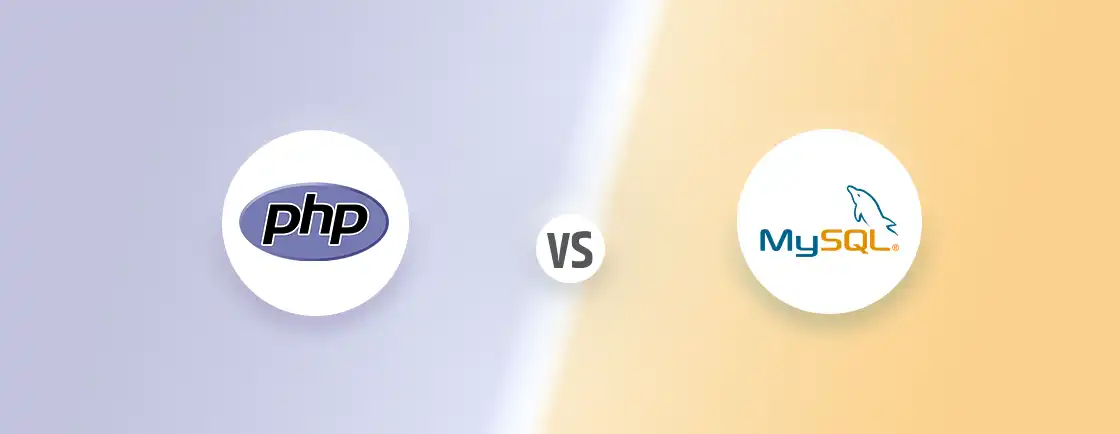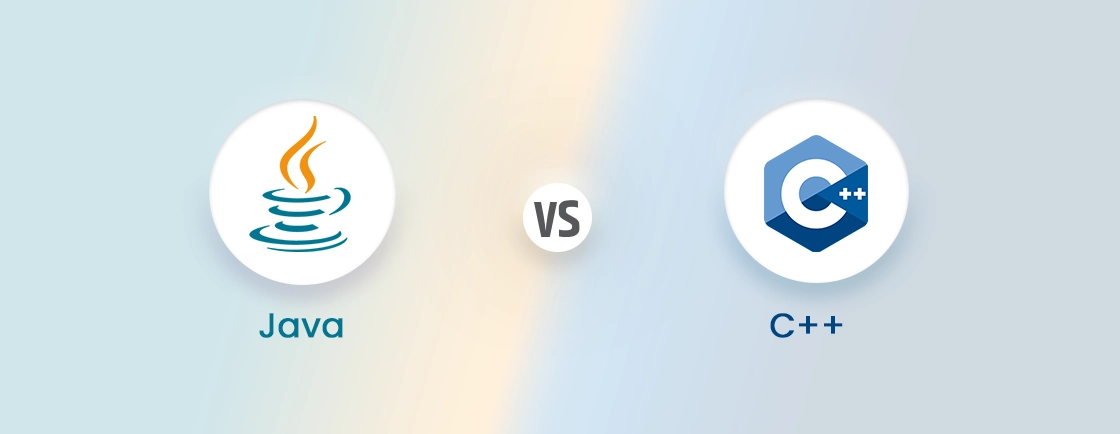Quick Summary
This article provides a detailed analysis of Rust and Python, based on their performance, memory safety, concurrency, ecosystem, and typical use cases. It guides developers in choosing the right language for their projects by highlighting Rust’s speed and safety advantages and Python’s rapid development and vast ecosystem.
Table of Contents
Since 1991, Python has been the language of choice for rapid development, data science, and machine learning. Companies such as Netflix, Google, and Instagram use it for its simplicity and third-party libraries. However, in recent years, programmers and performance-critical applications have increasingly adopted Rust. Introduced in 2010, Rust has been a safer C++ alternative. Dropbox, Discord, and Cloudflare are redesigning performance‑sensitive components with Rust for better performance and reliability.
Which language is better depends on your use case and scenario. This article compares Rust with Python, highlighting key differences, performance benchmarks, and real-world applications. After reading, you should be able to decide whether to choose Rust or Python for a new project or to migrate an existing one. Let’s get started!
Know About Python: Features, Benefits, and Limitations
Guido van Rossum introduced Python in 1991 with a focus on simplicity and readability. Its clear syntax is easy to learn because it is based on plain English. This makes it beginner-friendly but also powerful for expert coders.
Python’s simplicity and accessibility attract developers selecting between Rust and Python. Learning Python is easy, and that is a big advantage over Rust.
Best Features of Python
1. Easy Syntax and Readability: Python’s indentation-based structure simplifies syntax. Developers can write fewer lines of code in Python while keeping readability at a maximum.
2. Extensive Libraries and Frameworks: Python has a vast ecosystem of libraries and frameworks. Django and Flask for web development, NumPy and Pandas for data science, TensorFlow and PyTorch for machine learning, and many others. These libraries reduce the need to make solutions from scratch. Python has solutions for basically any programming issue because of its popularity and uses.
3. Dynamic Typing: With explicit type definitions, variables let developers focus on functionality. This flexibility speeds development and reduces boilerplate.
4. Strong Community Support: The Python community is large and active after decades of use. Python is great for teams and organizations since it’s easy to find solutions, tutorials, and documentation on almost any issue.
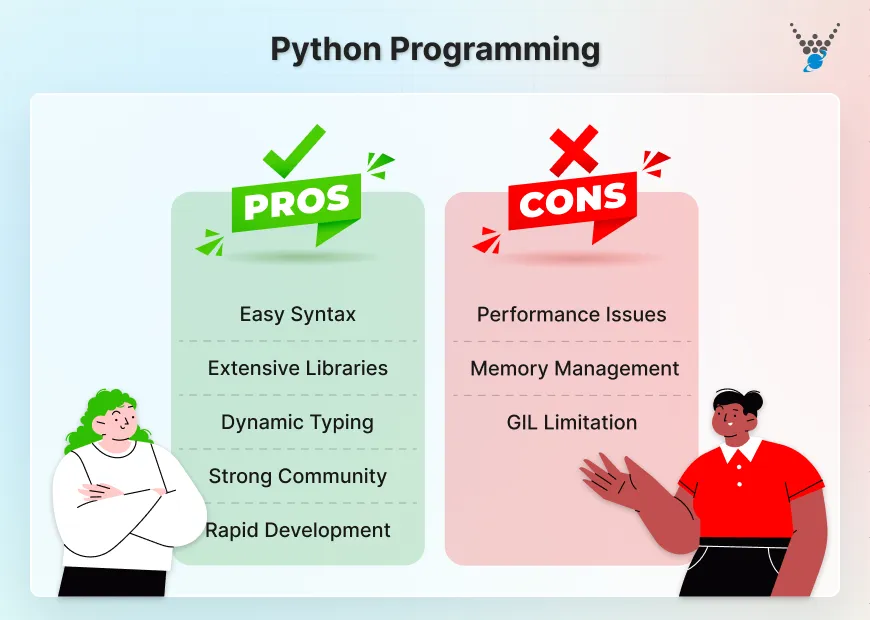
Benefits of Python
- Python excels at rapid development and reducing time-to-market.
- Its ability to swiftly prototype concepts benefits startups and agile teams.
- The mix of simple syntax and rich libraries helps developers to do more with less code.
- Python is the de facto standard in AI and data science.
- It powers machine learning, data analysis, and AI research at major technology companies.
- The Python code works easily on Windows, macOS, and Linux.
Limitations of Python
- Python’s line-by-line execution adds speed overhead.
- It is 50-60 times slower than Rust for CPU-intensive workloads.
- Python 3.13 introduced an experimental JIT compiler, improving performance by 2–9%; however, it still lags in raw speed.
- The automated garbage collection is useful but causes unpredictable pauses and memory consumption.
- The Global Interpreter Lock (GIL) is the most infamous restriction of Python. It prevents multi-threaded CPU-bound programs from running in parallel.
Know About Rust: Features, Benefits, and Limitations
Graydon Hoare at Mozilla Research created Rust in 2010 to develop a systems programming language with C and C++. The goal was to achieve high performance with memory safety, and that was accomplished. That’s why Rust’s performance has attracted companies and open-source projects since its 1st 2015 version release.
The 2024 White House report proposing memory-safe programming languages highlighted Rust for cybersecurity. DARPA then announced the TRACTOR program to transfer C code to Rust. This shows the government’s confidence in the language’s safety.
Best Features of Rust
1. Memory Safety Without Garbage Collection: Rust’s ownership model assures compile-time memory safety without garbage collection. Borrowing rules prevent C and C++ vulnerabilities. This gives Rust an edge over Python for system programming. The other languages can’t match Rust or even Python’s safety.
2. Zero-Cost Abstractions: In Rust, high-level abstractions are compiled to efficient machine code without runtime overhead. As fast as C++, Rust lets you write safe and simple-to-understand code.
3. Concurrency and Thread Safety: The way ownership works in Rust stops runtime data races. Data can be accessed and changed by more than one thread at the same time.
4. Compiles to Native Code: Rust compiles directly to machine code. There is no extra work for an interpreter or virtual machine; it’s simply fast and direct processing.
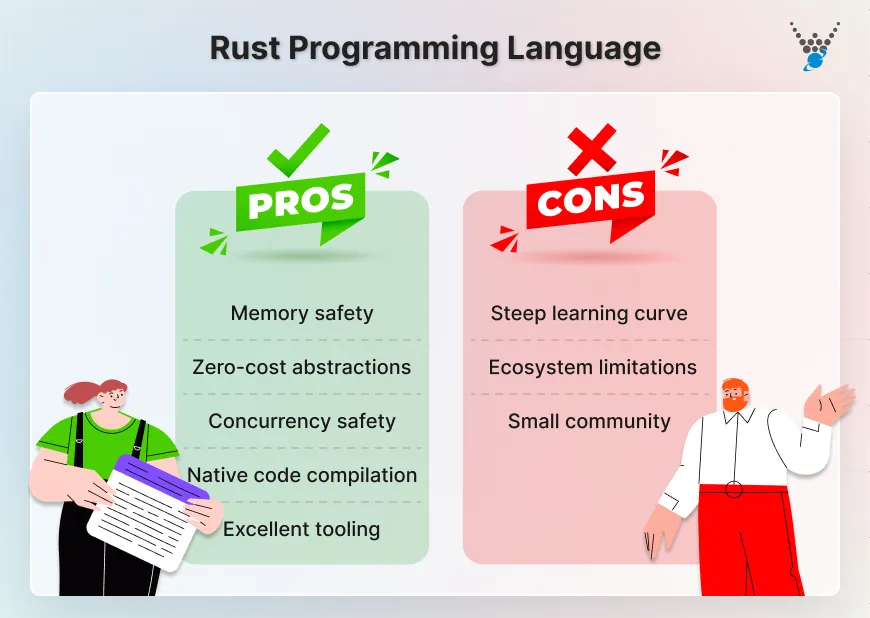
Benefits of Rust
- Rust’s compiled nature and memory management deliver near C++ performance, making it the go-to language for performance-intensive applications.
- In the Rust vs Python benchmark category, Rust consistently outperforms.
- The performance metrics comparing Rust and Python results in Rust’s advantages as well.
- For system-level programming, the strict compiler catches whole categories of defects at build time, making software more reliable and secure.
- Cargo (package manager and build system), Clippy (linter), and Rustfmt are best for a great development experience.
- Compiled error messages in Rust are very useful.
Limitations of Rust
- Rust requires abstractions such as ownership, borrowing, and lifetimes. Many beginners find this difficult.
- Learning requires some programming experience. The skills needed for Rust and Python differ greatly.
- Rust’s ecosystem is growing rapidly, but it still lags behind Python. Especially in domains such as machine learning and data science.
- Though passionate and supportive, Rust’s community is far smaller than Python’s, so niche issues can be harder to resolve.
Rust vs Python – The Major Differences
Let’s compare Rust with Python across key metrics. Below is a Python vs Rust comparison:
| Aspect | Python | Rust |
|---|---|---|
| Type System | Dynamic typing | Static, strong typing |
| Compilation | Interpreted | Compiled to native code |
| Performance | Slower execution | Near C/C++ speeds |
| Memory Management | Automatic garbage collection | Ownership model, compile-time |
| Concurrency | Limited by GIL | Built-in, data-race free |
| Learning Curve | Gentle | Steep |
| Syntax Complexity | Simple, readable | More verbose, C-like |
| Error Handling | Exceptions at runtime | Result/Option types at compile-time |
| Ecosystem | Massive and mature | Growing and specialized |
| Community Size | Very large | Smaller but growing |
Python vs Rust – A Detailed Comparison
Learning Rust and Python in more depth will help you choose the right programming language for your business. Let’s compare the powerful features and benefits of each language.
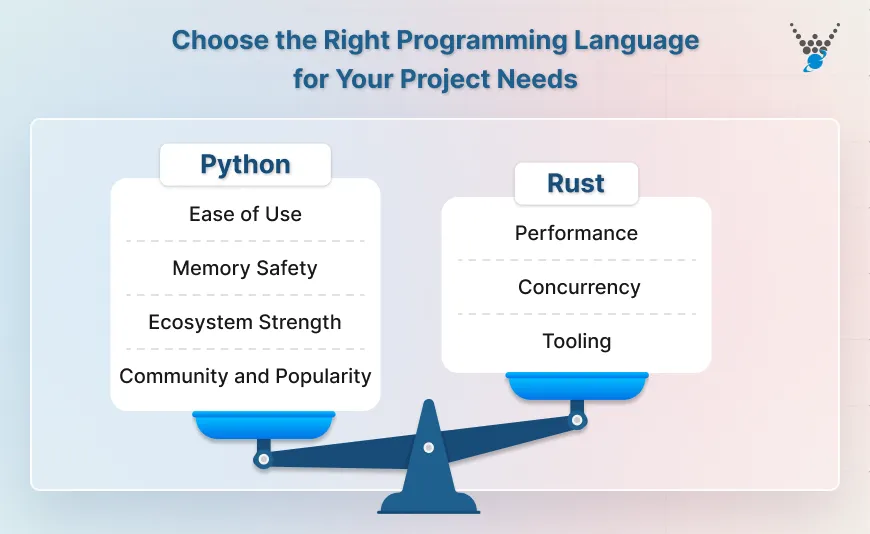
1. Ease of Use & Syntax
In Python, writing a simple action usually takes fewer lines of code and less extra work with syntax than in Rust. One clear example of this is the difference between Python and Rust syntax:
In the following examples, the reverse string operation will be done in Python and Rust.
Python:
s = "hello"
rev = s[::-1]
print(rev) # "olleh"
Rust:
fn main() {
let s = "hello";
let rev: String = s.chars().rev().collect();
println!("{}", rev); // "olleh"
}
Python’s ease of use is a huge plus for beginners or teams that value speed over raw performance.
Winner: Python wins decisively in this category!
2. Performance Benchmarks
Rust’s compiled nature gives it a 5-10x performance advantage over Python in intense operations. The Rust performance vs Python difference is substantial. Here’s why:
- No Interpreter Overhead: Python executes bytecode at runtime, line by line. Rust is compiled ahead of time into native machine code.
- Efficient Memory Management: Rust’s ownership model avoids pauses from garbage collection, making performance more predictable.
- Compiler Optimizations: Rust’s compiler applies aggressive optimizations that further boost runtime speed.
For data processing operations, algorithms, and intensive tasks, Rust has substantially better performance. So in the Rust vs Python speed benchmarks category, Rust wins for heavy workloads.
Winner: Rust is clearly a winner here.
3. Memory Safety
Rust’s Approach: The ownership model enforces strict rules at compile time. Each piece of data has a single owner, preventing null pointer dereferences, use-after-free bugs, and data races automatically.
Python’s Approach: Automatic garbage collection handles memory management at runtime. So you need to check regularly for unused objects and reclaim their memory. This is convenient but adds runtime overhead and less predictable performance.
Rust is more efficient for performance-critical applications, while Python is convenient for rapid development.
Winner: Rust wins over Python for memory safety in this category.
4. Concurrency Handling
Rust enables safe multi-threaded programming through its type system. Multiple threads can access shared data safely. This is because the compiler enforces that only one thread can mutate data at a time.
On the other hand, Python’s Global Interpreter Lock (GIL) prevents true parallel execution of Python bytecode in multithreaded tasks. For I/O-bound operations, threading works reasonably well, but CPU-intensive work requires multiprocessing or other workarounds.
For highly concurrent applications, Rust is far more efficient. This is a major factor in the Rust vs Python concurrency debate.
Winner: Again, you can choose Rust over Python for concurrency handling.
5. Ecosystem Strength
Python Ecosystem: Best for data science, AI, and machine learning. NumPy, Pandas, TensorFlow, PyTorch, and scikit-learn are industry standards. Django and Flask are also strong web frameworks. In the Python vs Rust ecosystem comparison, Python’s breadth is unquestionable.
Github Repo: https://github.com/python
Rust Ecosystem: Excels in performance-critical domains. Actix Web provides high-performance backend services. Polars is gaining traction as a Rust-based dataframe library, outperforming Pandas. Serde dominates serialization. Tokio offers high-performance async programming.
Github Repo: https://github.com/rust-lang
Winner: This depends on your domain, but we would choose Python for its scalability, vast libraries, and ecosystem familiarity.
6. Tooling
Rust: Cargo provides unified package management, building, and testing. Clippy comes with powerful linting. Rust Analyzer provides excellent IDE support.
Python: pip handles packages, but environment management requires additional tools like virtualenv or Poetry. PyCharm and VS Code provide excellent IDE support, though managing dependencies can be more fragmented. Apart from that, the Python market share is huge according to reports. So for many people, it might be the go-to language.
Winner: Rust has zero-cost abstractions, but Python can actually get work done without fighting the compiler for an hour.
7. Community and Popularity
Python has a much larger, more established community. You’ll find answers to literally any Python question online. You can even learn from books or tutorials or courses. When you need community support in the Python vs. Rust decision, Python’s size is a big advantage.
Rust’s community, while smaller, is engaged and enthusiastic. Documentation is excellent and geared toward learning. The community is actively growing, particularly in systems programming circles.
Winner: Looks like Python is on a Hat-trick! This one goes to Python for obvious reasons. Hire Python developers to get your project developed at scale.
8. Use Case Summary
Python is Great for AI/ML, web development, data analytics, scripting, and automation.
Rust is Great for Game engines, system tools, software structure, high-performance backends, and blockchain.
When To Use Rust vs Python?
Use Python When:
- Rapid Development is Required: You need to move from idea to market quickly without sacrificing code quality. In the comparisons between Python and Rust, Python clearly favors rapid development. Choose Python for web development in most cases, as it is made for it.
- Your Project Involves AI, ML, or Data Science: Python’s library ecosystem is unmatched in these domains. The Rust vs Python gap is largest here.
- Developer Resources Prioritize Readability and Library Support: Teams familiar with Python can be productive immediately.
- You’re Prototyping or Building MVPs: Python’s development speed makes it ideal for testing ideas.
Use Rust When:
- Performance-Critical Operations are Important: Your application requires near C++ speed and efficiency. Here, Rust vs Python decisively favors Rust.
- Working on Embedded Systems, Compilers, or Low-Level Software: Rust provides safe low-level control impossible in Python.
- Memory Safety and Concurrency: When you’re building systems where bugs could have serious consequences.
Can You Use Both Python and Rust?
Yes. Forward-thinking companies often use both languages strategically. Write performance-critical algorithms in Rust and expose them as Python libraries. Many organizations use Python for orchestration, testing, and higher-level logic. On the other hand, they use Rust for computationally intensive operations.
Tools like PyO3 and Maturin make this interoperability very easy. Organizations adopting a Rust and Python hybrid strategy report excellent results.
Polars, a high-performance DataFrame library written in Rust with Python bindings, demonstrates that a Rust and Python approach works well by combining Rust’s speed with Python’s ease of use!
What Companies Use Rust and Python?
Companies Using Python:
- Netflix
- Dropbox
- Spotify
All rely on Python for various parts of their infrastructure, particularly data analysis and machine learning. Their adoption shows Python’s suitability for large-scale operations.
Companies Using Rust:
- Mozilla (creator of Firefox)
- Amazon (EC2 and other AWS services)
- Dropbox (file synchronization)
- Discord
- Microsoft (Windows components)
- Cloudflare
- Linux Kernel
All have adopted Rust for performance-critical systems. Their use of Rust shows its viability for mission-critical applications.
Discover other backend and programming comparisons:
Conclusion
Choosing between Rust and Python completely depends on your priorities. Python’s simplicity, versatility, and rapid development make it the go-to language for data science, machine learning, and web apps. Rust is great for systems programming, embedded development, and applications that require high performance, strong memory safety, and robust concurrency guarantees.
Teams that grasp both languages and use their strengths will certainly succeed in the future. As Rust’s ecosystem evolves and Python optimizes performance, some use cases may overlap, but their core ideas will keep them in distinct niches for years. Partner with our Python development company to get your project done in no time.
FAQs
Is Rust Faster Than Python?
Yes, greatly. The compiled nature, efficient memory management, and zero-cost abstractions of Rust make it 5-10x faster than Python for CPU-intensive operations in benchmarks. For I/O-bound processes, the difference is minimal. Compared to Python, Rust is faster for intensive workloads.
Can Rust Replace Python?
Not entirely. Rust can do anything Python does, but it’s impractical for many applications. Because Rust has a harder learning curve and a smaller environment, it’s not good for iterative teams or rapid prototyping. It’s not a matter of replacing tools when you compare Python and Rust.
Which Is Better for AI and Machine Learning?
Python clearly leads AI and machine learning due to its mature ecosystem, including TensorFlow, PyTorch, and scikit-learn. Rust lacks comparable ML libraries but is widely used for building high-performance inference engines. This is similar to Node.js vs PHP, where Node.js fits real-time data processing while PHP has limited AI use. Overall, Python remains the preferred choice for AI development, with Rust supporting performance-critical components.
Which Is Better for Web Development?
Python (Django, Flask) is better for quick web development. Performance-critical backends with high throughput benefit from Rust (Actix, Rocket). Many firms develop in Python, then move performance-critical parts to Rust. Choosing Python vs Rust for web development depends on your demands and business requirements.
Is Rust Difficult to Learn?
Yes, if compared to Python. Unlike most languages, Rust requires an understanding of ownership, borrowing, and lifetimes. However, these concepts can be learned as well, and it gets easier once you start coding regularly. This eventually makes systems programming learning worthwhile. But beginners do find Python easier than Rust.
Ready to Choose the Best Language for Your Next Project?
Rust or Python, boost your development workflow today!



